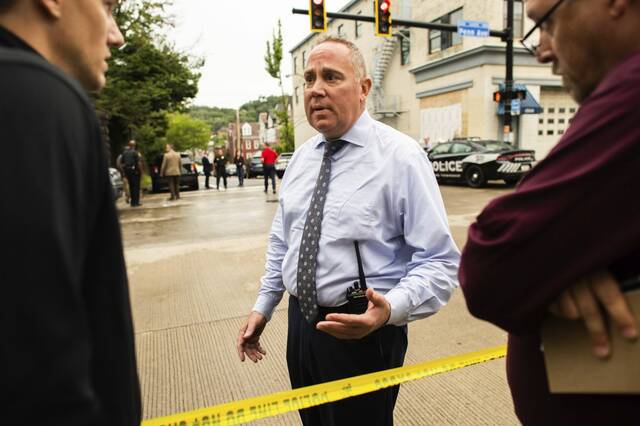It is critical that people have trust in the police.
The relationship between the public and police officers depends on an understanding of best interests. Like child and parent or student and teacher, it is more than just authority. It is a belief in doing the right thing.
At least, it is supposed to be.
Police officers being human beings, that isn’t always how it works out.
On Tuesday, Allegheny County Sheriff Kevin M. Kraus announced he had fired a deputy who participated in the six-hour standoff-turned-gunfight in Garfield on Aug. 23 in which William Hardison Jr., 63, died.
The reason? When incidents such as car crashes or shootings involve officers, sheriff’s deputies are routinely tested for drug use. The unnamed deputy tested positive for cocaine.
“We have a strict zero-tolerance drug-free work policy,” Kraus said. “It’s not easy to report.”
Last week, details of two Pittsburgh officers and their supervisor being disciplined were revealed in an arbitration appeal in Allegheny County Common Pleas Court. At odds were the differences between five days of unpaid suspension and simple oral reprimands.
The infraction? The two officers didn’t show up to provide police presence at a funeral Oct. 28. Instead, they went to pick up uniform pants. At noon, five people were shot at the church in what had been feared — retaliatory violence in an ongoing North Side feud.
“As not only police officers, but members of this community, we consider this totally unacceptable,” acting Police Chief Thomas Stangrecki said at the time, saying the incident would be investigated.
The arbitration panel sustained neglect of duty and conduct unbecoming an officer charges against Officer Thomas Potts but reduced his suspension to a reprimand and ordered back pay.
Whether that is appropriate as a course of employment law is one issue. The city is appealing the decision. The damage done by the officers’ behavior — both to the bodies of the wounded and the relationship between police and community — is another.
This type of behavior undermines trust. The same applies with the arrest of Greensburg’s then-Chief Shawn Denning in January or the swarming of Ligonier Valley’s police station in May when the chief’s phone and police vehicle were seized by state and federal authorities and he was subsequently fired.
Do we hold the police to a high bar? Yes. We must.
The transaction of trust and responsibility is how we can pull over on a dark road for a car with flashing lights. It is how we allow pat-downs or why we surrender weapons. It is the reason we call these strangers when we need help.
It is not just for the people’s safety that this is important. It is just as important for the safety and respect of all law enforcement that such trust is fostered.








